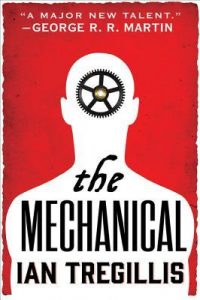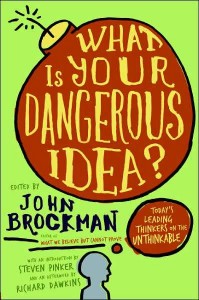 My grandpa only ever gave me one piece of advice (well, besides “keep your eyes on the damn road!”). He said, “They can take your land, they can take your property, they can even take your family, but,” pointing to his head, “they can’t take what is in here. They can’t take what you know. So, learn as much as you can.”
My grandpa only ever gave me one piece of advice (well, besides “keep your eyes on the damn road!”). He said, “They can take your land, they can take your property, they can even take your family, but,” pointing to his head, “they can’t take what is in here. They can’t take what you know. So, learn as much as you can.”
Well, what if they sort of could? Or at least, take away your ability to think for yourself?
That is sort of the premise of Ian Tregillis’ The Mechanical. The Mechanical is set in a world where, sometime after Europeans stumbled across the Americas, the Dutch find a way to make sentient machines, through some alchemical process discovered by famous Dutch scientist Christiaan Huygens (what?!? You’ve never heard of him? He discovered a moon of Saturn, invented the pendulum clock, and was a major authority on optics). This gives the Dutch a leg up in the world, and allows them to conquer pretty much all of Europe. Seemingly only the French remain to resist, and they must do this from a small enclave in exile on the North American continent. This is the backdrop for an amazing story of court intrigue, international politics, and a different approach to the discussion of slavery.
This is, because, we quickly come to learn that the machines the Dutch build their empire on not only think, but have some sort of free will, a free will that is subdued by whatever process creates them. Whenever they try to do anything that is not in direct fulfillment of their masters’ wishes, they experience extreme pain, a pain that grows until it is completely intolerable and the machine is forced to act to subdue the pain. “The head faded as he [one of the machines] abandoned his own wishes in favor of his masters’ whims.” Thus, the machines are slaves, forced to subvert their own will to that of their human masters’. Tregillis does a great job of describing the torment the machines feel whenever they try to do something on their own.
With this backdrop, Tregillis discusses free will, slavery, and equality, in a way that advances the plot of his story. One of the main characters, Jax, is one of these machines. But, there are several human characters that represent various views of the treatment of these machines. Not all humans are blind to the suffering of these machines, but even some that are against the Dutch would rather use the machines for their own purposes. “The prosperity achieved through slavery had a way of blinding men’s hearts to the evil of their own hands.”
Thus, along the way, Tregillis, while telling an immensely satisfying story, does get into some pretty deep thoughts about the nature of free will itself. Do the machines have free will? Maybe they don’t, by some definition, but then, maybe humans don’t either. For the machines, “Free Will was a vacuum, a negative space. It was the absence of coercion, the absence of compulsion, the absence of agony.” But, what does that mean for humans? “How did they order their daily existence without somebody to tell them what to do? Or was that the purpose of God?” Or are humans “Some squishy biological machine whose structure imbues it with a complex functioning and a delusional belief in its capability to determine its own course, but which all along follows a path predetermined by its own nature or maker?”
It is always nice to find a book that both provides a very interesting plot as well as thought-provoking material. The discussions about free will flow naturally through the course of the book, they are not force fed or heavy handed. Rather, they are integral to the relationship between the machines and the humans. They drive the plot forward. Tregillis does a great job of pulling these themes forward but in service of his story. I think my ony quibble is that, at the end of the story, some of the actions of some of the characters seem less than reasonable. One can chalk this up to the trauma some of them have endured up to that point, but it still seemed a little forced, like Tregillis needed a way to get to a certain point in the plot and this was the best he could come up with.
However, in spite of this, I am greatly looking forward to reading the next books in the series.

